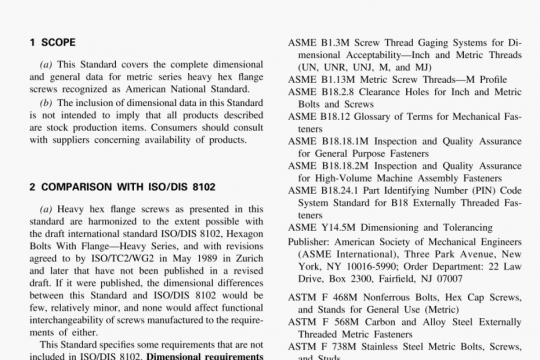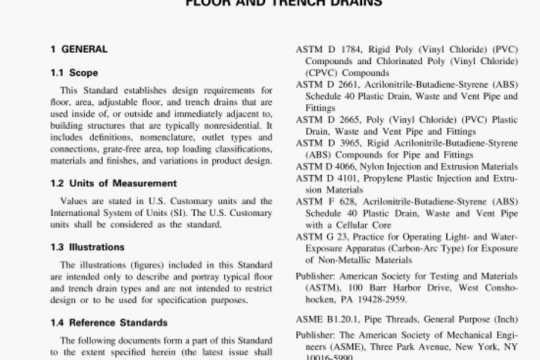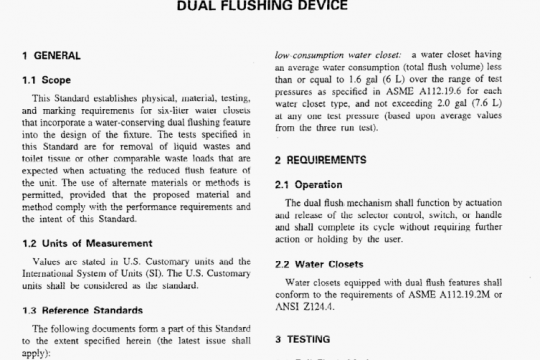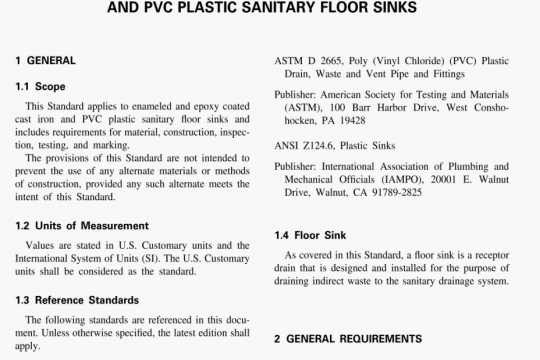ASME B16.20 pdf free download
ASME B16.20-2012 pdf free download.Metallic Gaskets for Pipe Flanges Ring-Joint, Spiral-Wound, and Jacketed.
3 SPIRAL-WOUND GASKETS
3.1 Size and Class
Spiral-wound gaskets, including centering ring and inner ring (paras. 3.2.4 and 3.2.5), are identified by flange size (NPS), pressure class, and the appropriate flange standard (ASME B16.5 or ASME B16.47).
3.2 Dimensions and Tolerances
3.2.1 General. Dimensions and tolerances for spiral-wound gaskets, centering rings, and inner rings shall be in accordance with Tables 9 through 14 (Tables I through 1-9 of Mandatory Appendix I) and as specified in this section (see also Figs. I and 1-1).
3.2.2 Construction. Spiral-wound gaskets shall he constructed as alternate plies (circular layers counted as revolutions) of preformed metal windings and pliant fillers that are spirally wound. For the finished gasket, the filler shall be essentially flush with, but not below, the metal winding on both contact faces of the gasket. The metal strip in the winding shall be 0.15-mm (0.006-in.) to 0.23-mm (0.009-in.) thick. The filler material thickness shall be determined by the manufacturer.
3.2.3 Metal Joining. The inner windings shall have a minimum of three plies of preformed metal strip without filler. The initial two plies shall have spot welds spaced around the inner circumference. The minimum number of welds shall be three. The maximum distance between welds shall be 76 mm (3.0 in.). The outer windings, which shall have a minimum of three plies of preformed metal without filler, shall be spot-welded circumferentially with a minimum of three welds, the last of which shall be the terminal weld.
The distance of the first weld from the terminal weld shall be no greater than 38 mm (1.5 in.). Up to four additional loose preformed metal windings beyond the terminal weld may be used to retain the gasket into the centering ring.
3.2.4 Centering Ring. All spiral-wound gaskets shall be furnished assembled into a centering ring. The centering ring thickness shall be from 2.97mm (0.117 in.) to 3.33mm (0.131 in.) and suitably grooved on the inside diameter so as to retain the gasket.
3.2.5 Inner Ring. Inward buckling of spiral-wound gaskets has been identified as a potential problem. Inner rings shall be furnished with all spiral-wound gaskets having I’TFE (polytetrafluoroethylene) filler material. Inner rings for flexible graphite-filled, spiral-wound gaskets shall be furnished unless the purchaser specifies otherwise.
For all filler materials, inner rings shall be furnished in spiral-wound gaskets for
(a) NI’S 24 and larger in Class 900
(I’) NI’S 12 and larger in Class 1500
(C) NI’S 4 and larger in Class 2500
Inner rings are required for these gaskets due to high available bolt loads, which may result in outer ring damage.
The inner ring thickness shall be from 2.97 mm to 3.33 mm (0.117 in. to 0.131 in.).
Tables 12 through 14 (Tables 1-7 through 1-9 of Mandatory Appendix I) shos’ inner ring inside diameters that may extend a maximum of 1.5 mm (0.06 in.) into the flange bore under the worst combination of flange bore, eccentric installation, and tolerance.
Gaskets with inner rings should be used only with socket welding, lapped, welding neck, and integral flanges. Reference Table 15 for minimum pipe wall thickness for use with gaskets with inner rings. Reference Tables 16 through 18 (Tables 1-10 and I-Il of Mandatory Appendix I) for maximum allowable bore for use with gaskets without inner rings.
3.2.6 Gasket Compression. Spiral-wound gaskets NPS !‘, NPS 34, and NI’S I in Classes 150, 300, and 600 shall be designed so that a uniform bolt stress of 172 MPa (25,000 psi), based on the nominal bolt root diameter, will compress the gasket to a thickness of 3.30 mm ± 0.13 mm (0.130 in. ± 0.005 in.). All other gasket sizes and classes shall be designed so that a uniform bolt stress of 207 MPa (30,000 psi) will compress the gasket toa thickness of 3.30mm ± 0.13mm (0.130 in. ± 0.005 in.).ASME B16.20 pdf download.




